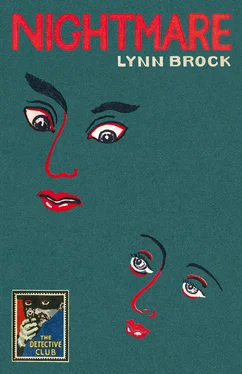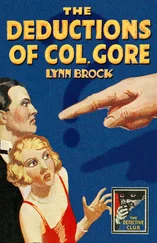For the Knayles were one of the oldest families in Barshire and intricately linked with many others of the same standing all over the west country. It is true that the particular branch of the family to which Harvey Knayle belonged had declined considerably, financially, during the past century. None the less, as things had fallen out with the help of a war, the little man who lay there sleeping peacefully, with one cheek cupped in a well-shaped hand, his knees tucked up, and a smile of child-like content upon his face, was separated by but three lives from a baronetcy, one of the largest estates in the county, and an income of fifty or sixty thousand a year. There was no likelihood whatever that he would become the actual possessor of this dignity and affluence. But it was a source of mild gratification to him that a large number of people—without ill-will towards the three healthy obstacles—quite sincerely hoped that somehow, some day, he would. Meanwhile he had an income of something over two thousand a year from sound investments, hosts of friends, excellent health, and an unfailing interest in the game of life. More especially, as will be seen—this was one of the many reasons of his social popularity—in the games played by life with other people.
For, in point of fact, his own existence had been perfectly uneventful. From Oxford he had returned to his father’s house near Whanton and for a few years had lived the life of a country gentleman. But at thirty he had quickly wearied of unadulterated rurality and had migrated to Rockwood, Dunpool’s most select residential suburb, where, on the frontier between town and country, he had lived ever since in bachelor content. There he had found new friends and had still been within easy reach of old ones. He danced satisfactorily, was a sound bridge-player, a reliable and good-tempered performer at tennis and golf, a sometimes brilliant shot, a good horseman, and a keen fisherman. He knew everyone in the neighbourhood worth knowing and knew everything worth knowing about them. If not a brilliant conversationalist, he was an excellent listener; if he rarely strove to say an amusing thing, he never said a malicious one. Finally he was a Knayle. And so the past twenty-five years of his life (during the War he had acted very efficiently as Adjutant of a Remount Camp close to Rockwood) had flowed tranquilly along a rut of comfortable sociability, pleasantly varied by annual trips abroad. He had found during them plenty of time to take an interest in other people—an occupation which was, indeed, the principal pleasure of his life.
It is necessary, in view of subsequent events, to define his position on that drowsy afternoon, geographically, with a little greater accuracy.
The bedroom in which he lay was situated on the ground floor of a large four-storey house—its number was 47—in Downview Road, one of the main arteries of Rockwood. The house, detached, and formerly, like its fellows, the dignified and undivided residence of a succession of well-to-do tenants, had come down somewhat in a post-War world and had been converted into four flats, the upper two of which were reached by a steeply-pitched outer staircase of concrete built on to one side wall. At the moment the basement flat, beneath Mr Knayle—one went down a little flight of steps from the front garden to its front door—was let to a Mr Ridgeway, a solitary, elderly man, apparently without occupation. The first-floor flat, above Mr Knayle, was occupied by a Mr and Mrs Whalley. And the top flat, above Mr Whalley’s, was tenanted by a Mr Prossip, his wife, and his daughter.
Mr Knayle, as has been said, liked Rockwood. It was, of course, two hours by rail from London. But, though he ran up to London very frequently and had many friends living there, he was always glad to get out of it. Dunpool, he admitted, though it was still the sixth city of England, was a dingy, untidy, shabby-looking place, solely interested in the making of money, doggedly provincial in outlook. But Rockwood was picturesque, dignified, quiet, had agreeable literary and historical associations, and was notoriously healthy. There was a pleasant variety in the people one knew there—the commercial magnates of the city, people connected with the county families, retired Service people of all sorts, the men from the college and the university, people who moved about the world and did all sorts of things. It was true that a good deal of shabby gentility was hidden away in lodging-houses and boarding-houses, and that, since the War, many houses where one had dined and danced had been converted into flats in which curious-looking people lived now. But curious-looking people were everywhere now. One could always avoid seeing them. On the whole Mr Knayle thought Rockwood as good a place as any to live in. At any rate, everyone knew who one was.
At half-past three, as he had arranged, Mr Knayle was awakened by the entry of his servant, Hopgood, and opened his eyes—bright blue eyes—permanently a little surprised, but with a birdlike quickness of movement and fixity of gaze. They watched Hopgood let up the blinds, observed that outside the windows the gloom of the afternoon had deepened to definite menace, and closed themselves again with resignation.
‘No tennis this afternoon, I’m afraid, Hopgood. Looks rather like a thunderstorm, doesn’t it?’
Hopgood, a neat, stolid, oldish man, turned to face his employer. He had been in Mr Knayle’s service for many years and was permitted, upon reasonable occasion, a reasonable liberty of speech.
‘Well, all I can say, sir,’ he replied, his usually colourless voice tinged with acidity, ‘is that if there is one, I hope a good old thunderbolt will plop into the top flat of this house.’
Mr Knayle, opening his eyes again, smiled sympathetically upon his retainer’s grimness of visage and, divining its cause, cocked an ear to catch a remote wailing which had of late grown familiar.
‘Mr Prossip’s gramophone busy again, I hear.’
So far Hopgood, emulating his master’s stoicism, had refrained from complaint of the annoyance to which they had both been subjected for a considerable time past. But, having made up his mind to complain of it, he had entered the room determined to do so, after his fashion, thoroughly.
‘Busy, sir?’ He produced from a pocket a befigured slip. ‘I’d like to ask you, sir, if you have any idea how many times that gramophone plays that same old tune in the day?’
‘None whatever,’ replied Mr Knayle placidly, inserting his neat legs into the trousers with which Hopgood had supplied him. ‘Have you?’
‘Well, I’ve been working it out this afternoon, sir, timing it and taking the average. Say it takes four minutes to play the tune—including stops—though there’s not many stops once it starts. Very well, that’s fifteen times it plays it in an hour. In the morning it plays it from eight o’clock to ten o’clock. In the afternoon it plays it from half-past one until four. And at night it plays it from ten to eleven. That’s five and a half hours a day. If you multiply that by fifteen, sir, you get it that it plays it eighty-two times in the day. And it’s been doing that now for seventeen days. What I make of it, sir, is that since they began that silly game up there in the top flat—last Saturday week it was—their gramophone has played that same blessed old tune fourteen hundred times.’
He put away his memorandum with lips tightened impressively and helped Mr Knayle into his coat.
‘Quite a number of times,’ Mr Knayle agreed. ‘Involving quite a large amount of labour for someone—I should surmise some more than one.’
Читать дальше












